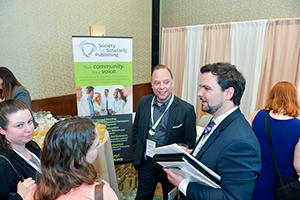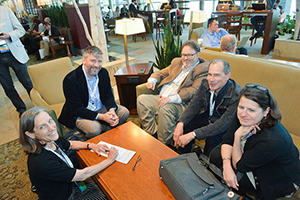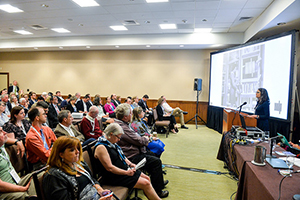Originally published in Research Information Viewpoints
Whether you have a clear career path mapped out in your mind, or are waiting on the next opportunity to present itself, taking that next step up the ladder requires a dedicated effort to continuously develop your skills, knowledge, and network. As a membership organization focused on the professional development of scholarly publishing professionals, the Society for Scholarly Publishing (SSP) has determined that several key strategies can help professionals accelerate their advancement. These proven approaches include mentorship, volunteerism, networking, and training and education.
Mentorship
 Mentorship is a reliable approach to advancing in one’s career, particularly for those new in their field or place of employment. Mentorship goes beyond training and education by helping newcomers navigate through the sometimes confusing or complex situations they can face. While mentorship is often associated with those early in their career, professionals can substantially benefit from mentorship at any stage of their career, both as a mentee or mentor.
Mentorship is a reliable approach to advancing in one’s career, particularly for those new in their field or place of employment. Mentorship goes beyond training and education by helping newcomers navigate through the sometimes confusing or complex situations they can face. While mentorship is often associated with those early in their career, professionals can substantially benefit from mentorship at any stage of their career, both as a mentee or mentor.
Because of the power of mentorship, SSP launched our Travel Grant program in 2011 and since that time have expanded the program to include year-round mentorship from industry veterans. Now called the Fellowship Program, it offers a wide range of career development and nurturing opportunities for students and early-career professionals in the scholarly communication industry. Additional benefits include year-round training opportunities, one-year complimentary SSP membership, free registrations to selected SSP events, and participation in community forums and SSP committees. Since 2011, nearly eighty-five students and early career professionals have participated in the program. Selection is highly-competitive as we receive 70-100 applications annually for twelve Fellowship grants.
The success of the SSP Fellowship program has led SSP members at all career levels to realize how much they could benefit from having a mentor or being a mentor. As a result, SSP is piloting a new Mentorship Program. By developing this new mentorship program, SSP can help shape the leaders of scholarly communications through expansion of their professional competencies; cultivating a diverse and high-quality pool of candidates in the workforce. This new program is ideal for professionals at all career levels to develop new relationships, share experiences, and learn from others outside their organizations. The pilot will run from June through November 2017.
Mentors benefit by giving back to the field, enjoying the satisfaction and impact of sharing their knowledge and experience, expanding their networks, and learning new things from their mentees, to name a few. Mentees benefit from new perspectives on their work, further developing their networks, gaining a sounding board for ideas and projects, and increasing their sense of self-worth.
Volunteerism
 Getting involved by serving on a committee, task force or Board of Directors with an organization like SSP is a great way to expand your network, gain valuable leadership skills and increase your personal and organizational visibility within the industry. Volunteer work allows professionals to build skills they may not have the opportunity to develop in their current job. There are no shortage of leadership opportunities for those that want to develop their interpersonal, organizational, communication or project management experience. Not only do volunteers learn more about the Society’s inner workings but they also gain knowledge and perspective from other committee members. Volunteering often leads to public recognition of your efforts and is a great way to make your mark if your current job doesn’t allow for much outward-facing interaction within the industry.
Getting involved by serving on a committee, task force or Board of Directors with an organization like SSP is a great way to expand your network, gain valuable leadership skills and increase your personal and organizational visibility within the industry. Volunteer work allows professionals to build skills they may not have the opportunity to develop in their current job. There are no shortage of leadership opportunities for those that want to develop their interpersonal, organizational, communication or project management experience. Not only do volunteers learn more about the Society’s inner workings but they also gain knowledge and perspective from other committee members. Volunteering often leads to public recognition of your efforts and is a great way to make your mark if your current job doesn’t allow for much outward-facing interaction within the industry.
SSP has an active base of volunteers. Nearly 25% of our membership dedicates their time to helping SSP be successful in one way or another. We have a number of standing committees and active task forces where members can lend their expertise and time. Those interested in getting involved can learn more on our website.
Networking
 Networking is critical at all career stages. Both mentorship and volunteering are great ways to build your professional network. Networking is nothing more than the act of connecting with people. Connecting is much easier when you can meet people with common interests or a common purpose. It’s easy to find such people at industry events such as the SSP Annual Meeting or at SSP Regional Events. At an event, a great way to make a new connection is to introduce yourself to the person sitting next to you at lunch or before a session starts or by asking other attendees what they thought of the most recent speaker.
Networking is critical at all career stages. Both mentorship and volunteering are great ways to build your professional network. Networking is nothing more than the act of connecting with people. Connecting is much easier when you can meet people with common interests or a common purpose. It’s easy to find such people at industry events such as the SSP Annual Meeting or at SSP Regional Events. At an event, a great way to make a new connection is to introduce yourself to the person sitting next to you at lunch or before a session starts or by asking other attendees what they thought of the most recent speaker.
People in your network can be a great resource for advice and information about the latest challenges and new developments facing the industry. They can also help you to learn about other potential career paths within scholarly publishing. And, since half of all jobs are never advertised, you’ll likely learn about opportunities that otherwise would go unnoticed.
Training and Education
It probably goes without saying that expanding your knowledge about the industry is essential to advancing your career. However, many professionals view providing continuing education as the sole responsibility of their employer. And while organizations do have an incentive to fund professional development for their staff, those that get ahead in today’s job market take professional development into their own hands. Most of the time employer investments align with the company’s goals, not your specific performance improvement needs for skills and experience that you might need to explore other career opportunities within the industry.
SSP offers a number of affordable training and educational opportunities such as webinars and Regional Events. The Scholarly Kitchen is another great (free!) way to stay on top of the latest industry developments. This year, we also offered a virtual attendance option for our Annual Meeting. This new option was half the price of attending the meeting in-person and required no travel. We recognize that not everyone has the opportunity or flexibility to travel, and offer this alternative to ensure the widest possible dissemination of our programming.
While many people may enter the scholarly publishing field by chance, those that continue to climb the career ladder don’t rise to the top by accident. They’ve cultivated their careers through mentorship, continuing education, networking and volunteering. Consider employing these proven approaches to further advance your career, whatever your path may be. Joining our community is a great place to start!



Join the Conversation
You must be logged in to post a comment.